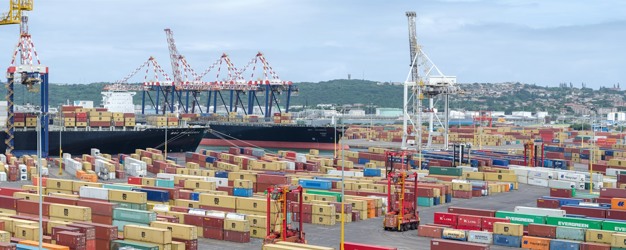At an agricultural technology event Citrus Growers' Association Justin Chadwick shared his frustration that, after the collective effort of many years by the private sector to convince the South African government of the merits of port privatization, its very first foray into outsourcing port management, is being delayed by members of the same private sector.
"AP Moller-Maersk have now taken the joint venture with ICTSI to court, as is their right, but it is a tragedy in that it has delayed the process which was meant to start in April," Chadwick told attendees to the AgrigateOne Tech Day.

Durban Container Terminal (photo © Druid007 | Dreamstime.com)
The contract to hand over management of Durban Container Terminal Pier 2 to Philippines-based ICTSI to run Durban Container Terminal's pier 2 has been put on ice following the Durban High Court's granting of AP Moller Maersk's request to an interdict.
Even though the judgment is an interim interdict, and does not set aside the awarding of the DCT Pier 2 contract to International Container Terminal Services Incorporated (ICTSI) as Transnet clarifies in its response, it is a setback which will be felt for years.
In eight years the Citrus Growers' Association expects South Africa to have a hundred million more cartons (15kg) of citrus to export than it current does (2024's exports tally up to 165 million) and they also know, Chadwick said, that South African ports would not be able to handle such a volume without private sector participation.
The second part to AP Moller' Maersk's legal challenge is to put a complete stop to the tender process, in which it was an unsuccessful bidder. This segment to their legal challenge still has to be heard in court, probably only in 2025. Should the contract be set aside by the Durban High Court, Transnet will re-open the tender process: following the court judgment, Transnet had re-affirmed its commitment to a privatization agenda, calling it among the cornerstones of its corporate strategy.
Privatization will stimulate competition amongst ports
Eventually, therefore, Pier 2 of the Durban Container Terminal will be privatized, possibly becoming a major hub in the region, even taking business away from other ports, Mitchell Brooke, CHA logistics manager explains. The competition arising between the operator of a privatized pier 2 and Transnet Port Terminals, specifically Pier 1, Point and Maydon Wharf terminals, is a salient point, he says.
"If any private partner were to increase productivity [at Pier 2] by 100% from say 12 gross crane moves per hour to say 25 gross crane moves per hour and above, it summarily increases berthing capacity by 100% or so. This means ships and containers will move faster and turnaround time will be very attractive for shipping lines to work ships at Pier 2, as opposed to other terminals. This could even make Pier 2 an attractive proposition for ships that aligned to Ngqura Container Terminal in the Eastern Cape, warranting a shift to Pier 2."
Brooke adds that much needed ship to shore cranes, straddle carriers and haulers are on their way to Pier 2 and arriving in due course, critically arriving ahead of the 2025 citrus season. "Based on this, we can assume that a fair degree of positive operational performance will follow."
